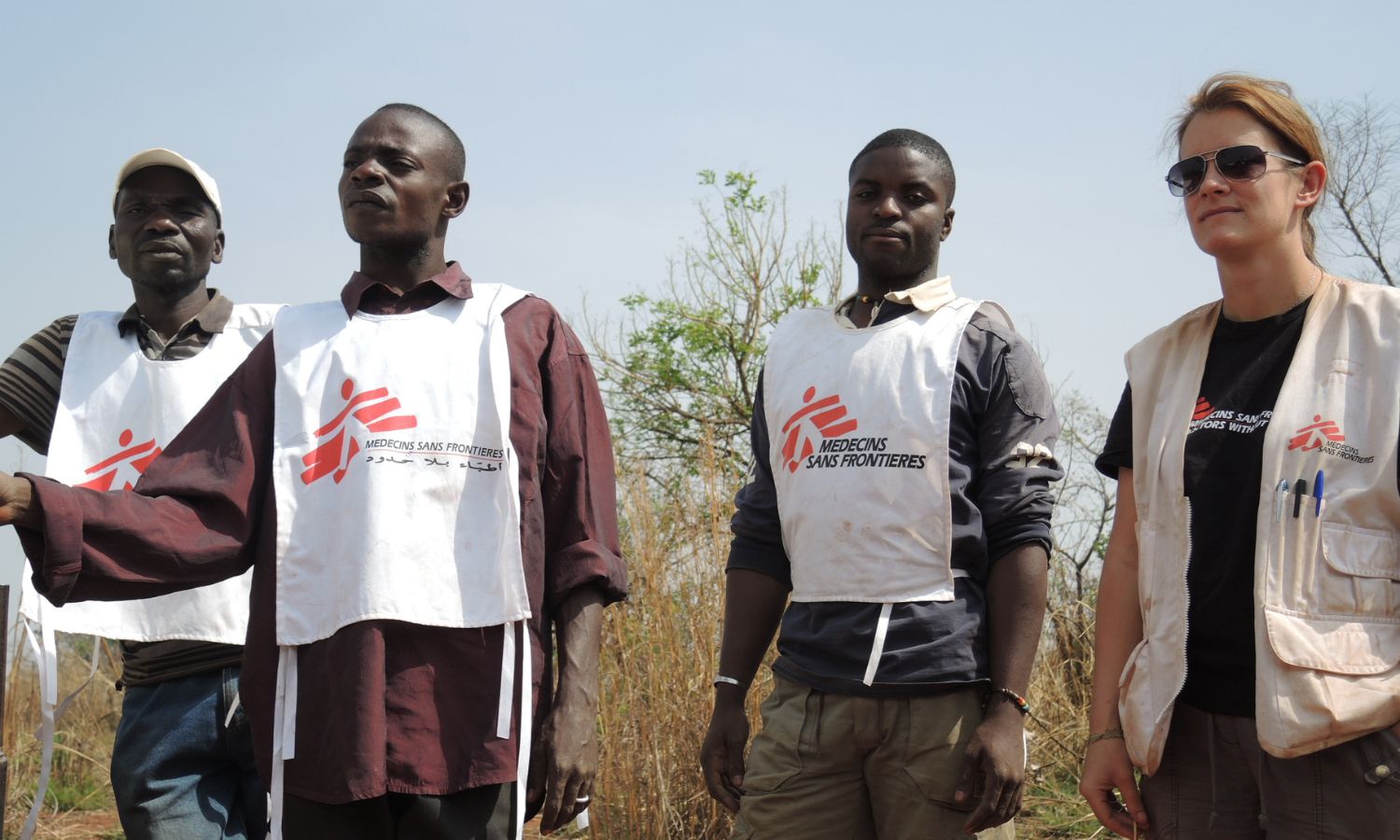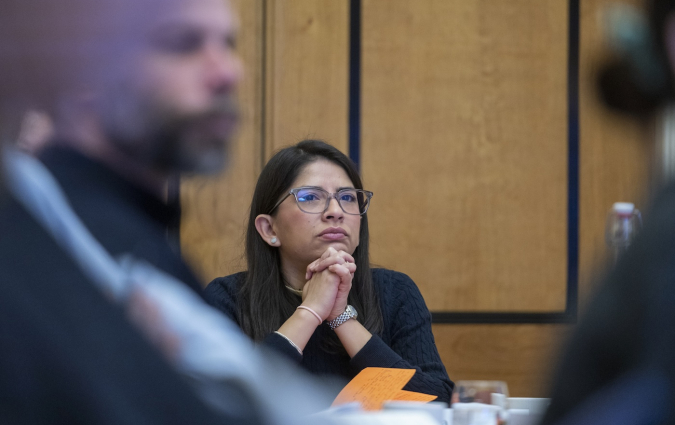How to run a mission-based organisation: Lessons for newsrooms from Doctors Without Borders

Natalie Roberts and her MSF colleagues in Bocaranga, Central African Republic, in 2014 | Credit: Courtesy of MSF UK.
Newsrooms and humanitarian organisations have something in common: staff rarely join for the paycheck. They commit to demanding, sometimes dangerous work, usually for less pay than they could earn elsewhere. They put up with difficult hours, high stakes, and emotional strain, often because they are motivated by a desire to contribute to a broader social mission.
For journalists, that mission is to provide the public with reliable information about what is happening in the world. For NGOs like Doctors Without Borders (Médecins Sans Frontières, MSF), it’s to provide urgent medical care to people in crisis. In both cases, that dynamic poses a particular set of challenges for those steering the ship.
Dr Natalie Roberts is the Executive Director of MSF UK. She joined the organisation in 2012 after working as an emergency doctor in Britain’s NHS, and has since coordinated operations in conflict and crisis zones across Africa, Asia and the Middle East, including in Syria, Yemen, Ukraine, Pakistan, the Philippines, Ethiopia and the Central African Republic. In 2016 she became Head of Emergency Operations for MSF in Paris, overseeing MSF’s emergency response programmes worldwide. She was named Executive Director of the UK branch in 2022.
I spoke with Roberts about what it takes to run a mission-based organisation, and what newsroom leaders can learn from her experience.
On balancing mission with the mundane
One reality of running a mission-based organisation is that while the broader purpose may be inspiring, much of the daily work is not. Like all organisations, these places depend on a healthy dose of administrative, procedural, and logistical tasks that are often a bit mundane.
“People often join the organisation because they believe in our social mission,” Roberts says. “But if you're running a humanitarian operation, the reality is that there's a huge amount of day-to-day bureaucracy that needs to be done – stuff that seems quite boring, but is essential because the risks are particularly high in this work,” she says, referring to the safety protocols for staff and patients, and the careful oversight of donated funds needed to avoid risk of fraud or mismanagement of finances.
“That means that I actually need people on the team who are quite pedantic about the details.”
Roberts notes that new recruits often arrive with a “save the world” vision and find themselves discouraged within a few months, when the reality of their role turns out to be largely administrative.
“The way I’ve found to get people through that dip is to actively talk about the social mission, a lot,” she says. “But talking about the general mission isn’t enough. You also need to make sure you are linking everybody's specific job to that mission, so everyone can see how they have their role within that.”
What you don't want, she says, is a dynamic where there are “the special people” – in MSF’s case, the doctors on the frontlines, and in newsrooms’ cases, the star correspondents or investigative reporters – who are “out there” doing the “real work”, while those in more administrative or support roles are treated as an afterthought, even if unintentionally or subconsciously. In MSF’s case, those support roles might be teams in fundraising or logistics, while in a newsroom, it might be those working in copyediting, distribution, or fact-checking.
To counter this, Roberts makes sure that “people get regular updates about MSF’s impact, and that all the managers at different levels of the organisation translate that impact to their specific teams’ work.”
On creating a healthy workplace culture
In both humanitarian work and journalism, another risk is that the mission starts to blur the line between personal and professional responsibility. Roberts is clear about the importance of work-life balance in this context, just like in any other organisation.
“It’s important to be clear that despite the mission, it is also just a job, whether you're at a desk in London or operating in the field in the Central African Republic. Everybody is paid a salary – it's not the best salary in the world, but everyone is paid to do a job, just like any other job,” Roberts says. “We therefore expect a certain level of performance, but as employers we also have a responsibility to make sure our staff are able to disconnect at the end of the working day - and that should be true no matter how stressful the situation you are working in is.”
As the Executive Director, she emphasises that part of her role is to set that culture from the top. “Of course, I can't be the one saying ‘Okay, you should go home now’ to every individual person at their desk. But I have to set that culture – and I also then need to make sure that there are structures in place to allow it to actually happen, which are respected all the way through the managerial line.”
Here, she cites MSF’s increasing focus on vicarious trauma training, and newly instated compulsory team sessions after particularly distressing events, like the death of a board member in Gaza last year. “It’s part of creating that culture where it's not a shameful thing to say you feel upset.”
She also makes it clear that you don’t have to be working as a surgeon on the frontlines to want a break from the stress of the job: “People [in the London office] can sometimes feel guilty about saying, ‘I’ve got to go and pick up my kids from school now,’ or complaining about working on a bank holiday, while knowing that others are living through trauma,” she explains. “So you have to be super explicit at the top level that anyone can feel [that they need to disconnect] at times, regardless of what role they're in.”
On delegation
Roberts also points out that being attuned to boundaries is important not just for staff, but for leaders themselves. “When I first came into this role, my colleagues from previous roles would still be contacting me and expecting me to be able to do something about a problem they were facing now that I was the Director.”
She quickly realised this was unsustainable. “I try to make sure that I'm directing them to the right place, rather than me taking it all on myself, because actually, that makes the problem worse. If I’m taking on every individual problem, then I won’t be able to raise my head above water to get that temperature check of what's going on in the organisation as a whole.”
Roberts notes how she has seen leaders who become enmeshed in every individual detail lose the wider perspective needed to steer the organisation as a whole. “You have to set boundaries. It's the only way you can have any longevity as a leader.”
She contrasts this with her previous role as Head of Emergencies at MSF, where being on call 24 hours a day was inherent to the role: “I don't know anybody who's managed to do that job for more than three years, at least not without some long breaks built in,” she says.
At the same time, she notes that leaders can’t retreat too far from the frontline either.
“As the Director, part of my job is to understand what MSF’s social mission is and should be today. I do that by receiving debriefings from my teams, attending meetings, and visiting sites – because sometimes you can't really understand a situation from a bullet point summary,” she says. “It can be really difficult to fit that in with the fact that I also need to attend regular board meetings, run management team meetings, and speak to the press, but it's important to keep that connection to the fieldwork.”
One solution she has found has been creating a Deputy role to her position, a role which didn’t exist before her leadership. “It means she can step in when I am away, which allows me to spend time on the broader things outside of the day-to-day business.”
The relationship does require some work and intentional communication to make sure both of them are in step with each other, and Roberts emphasises that mutual trust is required to make it work: “I trust the decisions she makes while I am away, and it's also important that when I come back, I support her decisions, rather than going, “I wouldn't have done it quite that way.”
Another delegation initiative that MSF UK has launched under Roberts’ leadership is the Staff Forum, a mechanism where staff get together to raise concerns about workplace problems, and, crucially, to collectively propose solutions to those problems. A member of the leadership team attends to listen, but does not propose solutions; the staff instead identify potential actions themselves, and highlight where they might need the management’s support to implement those.
“It’s still in its early days, but it's been a good way of creating a culture where people try to identify solutions as a team, rather than escalating every problem upwards.”
On learning to lead
Perhaps Roberts’ most transferable lesson for newsroom leaders comes from her reflections on leadership skills more generally: “The classic path at MSF is that you arrive as a medical doctor and if you’re good at that, or if you work in dangerous places, then you’ll get promoted. And then all of a sudden, your job is a lot of management and admin and budgets, which nobody ever taught you to do.”
The risk is that “you could be an amazing doctor, but if you don't learn the skills of leadership, it's difficult to do the job [of management and leadership] well.”
In newsrooms, the same pattern often plays out: Talented reporters are promoted into management roles with little preparation for the very different skillset required.
Roberts’ advice for those who find themselves newly (or not) in leadership roles? “Embrace some of the managerial culture that exists outside in other organisations – and recognise what you don't know.”
If you want to learn more, we offer newsroom leadership courses for both junior and senior newsroom leaders.
In every email we send you'll find original reporting, evidence-based insights, online seminars and readings curated from 100s of sources - all in 5 minutes.
- Twice a week
- More than 20,000 people receive it
- Unsubscribe any time







